
Frontiers in Climate
Scope & Guideline
Driving impactful research for a healthier planet.
Introduction
Aims and Scopes
- Climate Change Mitigation and Adaptation:
Research focusing on strategies to mitigate climate change impacts and enhance adaptive capacities, including carbon capture technologies and climate-resilient agricultural practices. - Interdisciplinary Approaches:
Encourages studies that integrate various disciplines such as social sciences, economics, and environmental sciences to address complex climate issues. - Impact Assessment:
Focuses on evaluating the socio-economic and environmental impacts of climate change and adaptation strategies, including vulnerability assessments and risk management. - Innovative Technologies:
Explores the role of emerging technologies in climate solutions, such as direct air capture, enhanced weathering, and geoengineering. - Community Engagement and Indigenous Knowledge:
Highlights the importance of local knowledge and community involvement in climate adaptation and resilience-building efforts. - Policy and Governance:
Examines the legal and policy frameworks surrounding climate action, including governance structures for carbon dioxide removal and climate finance.
Trending and Emerging
- Carbon Dioxide Removal (CDR) Technologies:
There is a growing emphasis on innovative CDR methods, including bioenergy with carbon capture and storage (BECCS) and direct air capture, reflecting an urgent need for viable solutions to achieve net-zero emissions. - Integration of Social Sciences in Climate Research:
Increasingly, research is incorporating social dimensions, such as gender, equity, and community engagement, to understand the societal impacts of climate change and enhance adaptation strategies. - Climate Risk Management and Resilience Building:
A trend towards comprehensive risk assessments and resilience planning is emerging, focusing on how communities can better prepare for and respond to climate impacts. - Nature-Based Solutions (NbS):
Research exploring the role of ecosystems in climate mitigation and adaptation is on the rise, emphasizing sustainable practices that harness natural processes. - Data-Driven Approaches and Machine Learning:
The application of advanced data analytics and machine learning techniques to improve climate predictions and inform decision-making is becoming increasingly prevalent.
Declining or Waning
- Traditional Climate Modeling:
While still important, there is a noticeable decline in the emphasis on conventional climate models without integrating socio-economic factors or stakeholder engagement. - Purely Scientific Research without Application:
Research that does not address practical applications or societal impacts is becoming less frequent, as the journal increasingly prioritizes actionable findings. - Regional Studies in Isolation:
There is a waning interest in studies that focus solely on local or regional climate phenomena without considering broader global implications or interconnections. - General Climate Awareness Campaigns:
Publications centered around general awareness without actionable insights or scientific backing are declining, as the focus shifts to evidence-based solutions.
Similar Journals
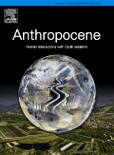
Anthropocene
Connecting Scholars to Address Global Ecological CrisesAnthropocene, published by Elsevier Science Ltd, is a leading journal dedicated to the interdisciplinary study of the Anthropocene epoch, focusing on the profound impacts of human activity on Earth systems and ecosystems. With an impressive impact factor reflected in its Q1 rankings in Earth and Planetary Sciences and Ecology, as well as a solid standing in Global and Planetary Change, this journal is a vital resource for researchers, professionals, and students striving to understand and address the pressing environmental challenges of our time. Since its inception in 2013, the journal has been committed to publishing high-quality, peer-reviewed articles that stimulate critical discourse and inspire innovative solutions to complex ecological issues. Although not an open-access journal, Anthropocene provides extensive access options through institutional subscriptions, making its significant research readily available to the academic community. Based in the United Kingdom, the journal serves as a cornerstone for scholarship in a rapidly evolving field, bridging gaps across disciplines and encouraging interdisciplinary collaboration for a sustainable future.
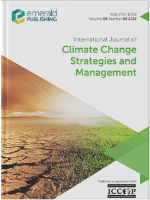
International Journal of Climate Change Strategies and Management
Empowering research to combat climate change challenges.Introducing the International Journal of Climate Change Strategies and Management, a premier publication dedicated to advancing the understanding and development of innovative strategies addressing climate change. Published by Emerald Group Publishing Ltd in the United Kingdom, this journal has established itself as a trusted source within the realms of development, geography, and environmental science. With an impressive 2023 impact factor reflecting its high citation rates and a Q1 classification in pivotal categories such as Development and Geography, the journal stands at the forefront of climate change discourse. Since adopting an Open Access model in 2018, it has broadened its reach, making cutting-edge research accessible to a global audience. The journal encompasses a wide array of topics essential for academics and practitioners alike, focusing on management, policy-making, and methods for effective monitoring of environmental strategies. By fostering interdisciplinary dialogue, the International Journal of Climate Change Strategies and Management is essential for those aiming to contribute to sustainable solutions in our rapidly changing world.
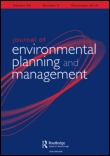
Journal of Environmental Planning and Management
Pioneering research for impactful environmental change.The Journal of Environmental Planning and Management, published by Routledge Journals, Taylor & Francis Ltd, is a leading academic journal dedicated to advancing the field of environmental science through innovative research and critical analysis. With a robust impact factor and categorized in Q1 across multiple disciplines, including Environmental Science, Geography, and Fluid Flow, this journal holds a prestigious position in the academic community. It serves as a vital platform for researchers, professionals, and students interested in the complexities of environmental management, policy, and planning, promoting insightful discourse on sustainable practices and innovative solutions. Although the journal does not currently offer Open Access options, it remains widely accessible through institutional subscriptions, ensuring that pertinent research reaches a broad audience. Since its inception in 1992, the journal has shown a commitment to excellence, making significant contributions to our understanding of environmental issues and the interplay between human activity and natural systems. The Journal of Environmental Planning and Management invites submissions that not only push the boundaries of existing knowledge but also foster interdisciplinary collaboration in the quest for sustainable development.

Nature Climate Change
Exploring Interdisciplinary Solutions for a Changing WorldNature Climate Change, published by NATURE PORTFOLIO, is a leading peer-reviewed journal in the fields of Environmental Science and Social Sciences. Established in 2011, this journal has garnered significant acclaim, with an impressive impact factor reflected in its 2023 Q1 ranking in both categories, making it rank #1 in Environmental Science (miscellaneous) and Social Sciences (miscellaneous), placing it in the 99th percentile. The journal aims to provide a comprehensive platform for the latest research and developments related to the social, economic, and environmental dimensions of climate change, thus fostering interdisciplinary dialogue and collaboration. Researchers, professionals, and students alike benefit from the journal's commitment to addressing the urgent challenges posed by climate change through innovative research, reviews, and commentary. Although not open access, the journal remains pivotal in shaping global discussions and policies surrounding climate issues. For those seeking indicative research trends and influences in climate change scholarship, Nature Climate Change serves as an essential resource that highlights innovative solutions and actionable insights.
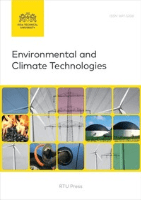
Environmental and Climate Technologies
Innovating Research for Climate Resilience.Environmental and Climate Technologies is a premier open-access journal dedicated to advancing knowledge in the fields of environmental science and renewable energy. Published by SCIENDO since 2009, this journal plays a crucial role in disseminating innovative research and interdisciplinary studies that address the pressing challenges posed by climate change and sustainable development. With its current positioning in the Q2 quartile for Environmental Science (miscellaneous) and Q3 for Renewable Energy, Sustainability and the Environment, it is recognized for its significant contributions to the academic community, ranking #107 out of 233 in General Environmental Science and #161 out of 270 in Renewable Energy. Hailing from Germany and operating under an open-access policy, Environmental and Climate Technologies ensures that research remains accessible to a global audience, fostering collaboration and discussion among researchers, professionals, and students alike. The journal invites rigorous scientific inquiries and practical solutions that can mitigate the impact of climate-related issues, making it a vital resource for those committed to environmental stewardship and sustainability.
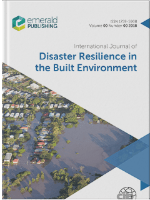
International Journal of Disaster Resilience in the Built Environment
Innovating for a disaster-ready future.International Journal of Disaster Resilience in the Built Environment is a leading peer-reviewed journal published by Emerald Group Publishing Ltd, focusing on the crucial intersection of disaster resilience and the built environment. Established in 2010, this journal serves as an essential platform for researchers, professionals, and students engaged in the fields of Building and Construction, as well as Safety, Risk, Reliability and Quality, maintaining a respectable Q3 ranking in both categories as of 2023. With a commitment to enhancing global knowledge on resilient construction practices, the journal examines innovative strategies to mitigate risk and enhance safety in built structures. Despite its robust academic reputation, it currently operates without an open access model, emphasizing its curated approach to high-quality scholarship. The publication aims to foster interdisciplinary collaboration and advance the development of sustainable practices within the context of disaster risk reduction, making it a vital resource for anyone dedicated to improving resilience in the built environment.

Euro-Mediterranean Journal for Environmental Integration
Driving Change Through Interdisciplinary Environmental ResearchThe Euro-Mediterranean Journal for Environmental Integration, published by SPRINGER HEIDELBERG, serves as a pivotal platform for interdisciplinary research in the realm of environmental science, particularly focused on the unique ecological and socio-economic context of the Euro-Mediterranean region. With its ISSN 2365-6433 and E-ISSN 2365-7448, this journal aims to foster a collaborative approach to environmental challenges, integrating insights from various fields such as ecology, geography, and sustainable development. Since its inception in 2016, it has made significant strides, achieving a Q3 ranking in Environmental Science and maintaining a notable position within the Scopus rankings, sitting at #102 out of 233 in the general environmental science category, which reflects its growing influence in academic discourse. The journal is committed to open dialogue among researchers, professionals, and students aimed at advancing knowledge and promoting innovative solutions to pressing environmental issues. Access to its comprehensive articles and findings will be key to contributing to a more sustainable future.

ECOLOGY AND SOCIETY
Fostering interdisciplinary dialogue for a sustainable future.ECOLOGY AND SOCIETY, published by the esteemed Resilience Alliance, stands as a paramount open-access journal in the field of ecology, having served the academic community since its establishment in 1997. With an impressive Q1 ranking in Ecology and an Scopus rank of 77 out of 461 in Environmental Science, this journal is dedicated to advancing our understanding of the interconnectedness between human societies and ecological systems. As a pioneer of open-access publishing since 2004, it ensures that cutting-edge research is freely accessible to all, thereby promoting knowledge sharing and collaboration among researchers, professionals, and students alike. The journal fosters interdisciplinary discourse and provides a platform for innovative studies that address pressing environmental challenges, making it a vital resource for anyone engaged in ecological research and practice.
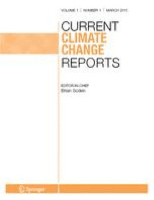
Current Climate Change Reports
Unveiling Insights into Climate DynamicsCurrent Climate Change Reports, published by SPRINGER HEIDELBERG, stands at the forefront of research in the realms of atmospheric science and global change, boasting an impressive Q1 category ranking in both fields as of 2023. With an ISSN of 2198-6061, this esteemed journal has been disseminating crucial findings since its inception in 2015 and continues to be a pivotal platform for scholarly discourse on climate issues. Based in Switzerland, the journal offers a comprehensive examination of climate dynamics, impacts, and sustainability solutions, thereby addressing the pressing challenges associated with climate change. While currently not available as open access, Current Climate Change Reports is indexed in Scopus, where it ranks in the top tiers, notably #2 in Atmospheric Science and #4 in Environmental Science, reflecting its significant influence and contribution to scientific knowledge. Researchers, professionals, and students alike will find this journal an indispensable resource for the latest developments and insights in climate research.
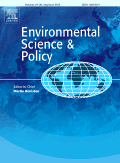
ENVIRONMENTAL SCIENCE & POLICY
Advancing knowledge at the intersection of environment and governance.ENVIRONMENTAL SCIENCE & POLICY, a leading journal published by Elsevier, serves as a pivotal platform for research that intertwines environmental science with policy development. With an ISSN of 1462-9011 and an E-ISSN of 1873-6416, this journal contributions outrival many, reflected by its 2023 Scopus rankings placing it in the Q1 category in both Geography, Planning and Development (Rank #36/821, 95th percentile) and Environmental Science, Management, Monitoring, Policy and Law (Rank #38/399, 90th percentile). Covering a broad spectrum of topics, it addresses critical interdisciplinary issues from 1998 to the present, fostering dialogue among researchers, policymakers, and practitioners alike. Although it does not offer Open Access options, the journal's rigorous peer-review process ensures high-quality and impactful publications, vital for anyone invested in advancing knowledge and practice in environmental governance and sustainable policy frameworks.